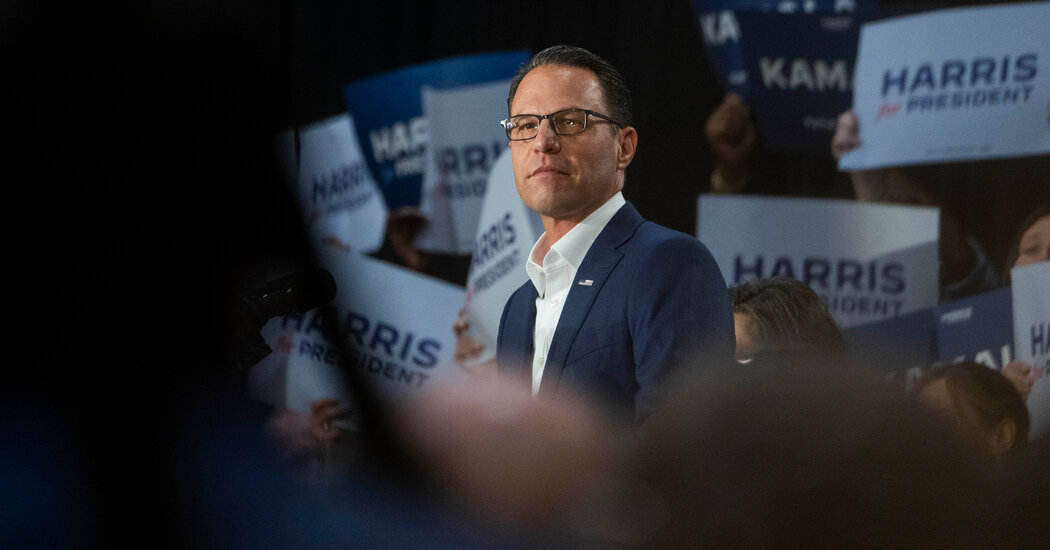EhringhausSouth
Distinguished Member
- Messages
- 280
Being purely objective, Walz could be a solid pick for Harris.
Follow along with the video below to see how to install our site as a web app on your home screen.
Note: This feature may not be available in some browsers.

I also had not noticed it until The Daily Show made mention of it. The clip should start playing at the appropriate part (5:21) but the whole video is worth a watch. I about fell over from laughing when Ronny did the joke about Harris climbing stairs.His "candance" is a lot like Obama I had never realized that
I get the electoral college math reasons for Shapiro or Waltz, but I think Kelly draws away lots of Trump voters. His military record is vastly superior to Vance's so the right can't harp on that, and the MAGAs will try mightily to link a Jewish candidate to their favorite boogeyman, George Soros. Plus I think Arizona is a slam dunk with Kelly as opposed to Pa still being a maybe with Shapiro.
This feels right. Over on The Bulwark subreddit, a progressive poster put it this way:Shapiro being self-consciously centrist, putting a couple of Republicans in his cabinet, talking about welcoming the support of Republicans for Shapiro, joking around with Tim Miller—that’s just normal intelligent behavior for a Dem politician in a swing state. For the left, still smarting from Biden’s win in 2020, it signifies a future of the party that disappoints them. The Squad was supposed to be the future. Or at least orthodox progressives were. A Shapiro pick—and Spanberger, Sherrill, et al—signifies a lot to them.
And the left never trusted Harris either.
I want to validate this concern: Since 2016 the Democratic party has been moving to the center and they do risk becoming ill defined.[T]he Ds have been constantly trying to expand their base to crowds like the Bulwark center Rs.
They're dangerously close to trying to become so much of something to everyone, that they will be nothing to nobody. They're too ill defined.
Kamala has that problem.
And yet . . . that’s the world we live in.Republicans can run on full-MAGA and still have a chance to win the White House but Democrats can’t even go as far as Elizabeth Warren without risking the whole shebang? I hate this.

I'm not sure why I'm posting this but Under Siege is one of my favorite movies and I always get a laugh when Stephen Seagal is locked in the fridge and the lowly guard is put outside who is arguing with him and Seagal under his breath calls him a "little E-1 prick." Always makes me chuckle.While not career military like Kelly, Walz did have 24 years in the National Guard, and was an E-9 which is the top of the enlisted ranks.
The thing is, though, if Pennsylvania doesn't go Democratic, the election is over anyway. Kamala has no shot at without winning Pennsylvania. Shapiro, IMO, gives the Harris campaign the *best and most likely* opportunity to win PA (though, obviously nothing is a guarantee) because he is unbelievably popular in Pennsylvania, and not just among Democrats/liberals. His approval rating is jaw-dropping in this age of hyperpartisan politics.I hope so. There are too many better options for Harris to go with Shapiro. Like I said in an earlier post, I don’t think it’s clear that he delivers Pennsylvania.
He does. It's in the high 60's. Walz is fairly high too at 56. For Shapiro, I've seen one recent poll having him at 61 percent, but another having him at only 49 percent (although with only 31 percent disapproving).IIRC, Beshear has the highest approval rating of any Democratic governor.
Yeah, Beshear would be a good addition to the ticket, too, no question about it. I just think that, because Kentucky is not even remotely in play for Democrats as Pennsylvania (Shapiro) and Arizona (Kelly) are, it doesn't make much sense IMO to choose Beshear over the other two. And even though Dems aren't in danger of losing Minnesota, Tim Walz can almost certainly make the Dems' chances of delivering Michigan and Wisconsin increase. So I just think it's got to be one of those three- nothing at all against Beshear, who I think is a fantastic governor.IIRC, Beshear has the highest approval rating of any Democratic governor.
I pretty much agree here although I personally like Walz and he was the one who delivered the "weird" playbook that has the GOP reeling. There's just something super authentic about him and I think people around the country would really like him. Shapiro has more upside and I could see him actually being the president in his own right one day, but I think Walz is the right guy for right now.The thing is, though, if Pennsylvania doesn't go Democratic, the election is over anyway. Kamala has no shot at without winning Pennsylvania. Shapiro, IMO, gives the Harris campaign the *best and most likely* opportunity to win PA (though, obviously nothing is a guarantee) because he is unbelievably popular in Pennsylvania, and not just among Democrats/liberals. His approval rating is jaw-dropping in this age of hyperpartisan politics.
To be clear, though, I'll be thrilled with any one of Shapiro, Walz, or Kelly in really no particular order. All three would be fantastic additions to the ticket. But I think that, as it pertains to Shapiro, if you can virtually guarantee that he can deliver PA, it's almost a no-brainer (to me).
I pretty much agree here although I personally like Walz and he was the one who delivered the "weird" playbook that has the GOP reeling. There's just something super authentic about him and I think people around the country would really like him. Shapiro has more upside and I could see him actually being the president in his own right one day, but I think Walz is the right guy for right now.
But if it's Shapiro or Kelly or even Beshear I'm not going to be mad. The only one I would really disagree with would be Pete.
I can't disagree with this. I also have a hard time believing one VP pick will flip any state.Agreed that Kentucky is not in play, but I’m of the mind that no VP choice delivers their state. I don’t think Cooper would’ve done it here either. Beshear is able to speak to a demographic that Harris is not as well equipped to.
Shapiro speaks to the same people as Harris, IMO. Look at Beshear’s appearance in Forsyth Co, GA, for example. Dems have to stop the bleeding in rural areas to win statewide in many of these states. I think Beshear helps win over more rural voters and even some conservative leaning independents.
That’s why I’d have:
1A: Beshear
1B: Walz
2: the rest
Walz is definitely the real deal. My parents, like many people, didn't know much about him even a week or so ago, and now they are totally on board with him. Mehdi Hassan himself didn't know about him until recently, either, and now is a complete fan. It makes me wonder if Biden had stepped aside sooner, Walz's name would have also been out there sooner, and his support would be even greater. But Harris has to make her decision in the next few days, so that tends to favor the Shapiros and Kellys, who already had a bit higher name recognition.I pretty much agree here although I personally like Walz and he was the one who delivered the "weird" playbook that has the GOP reeling. There's just something super authentic about him and I think people around the country would really like him. Shapiro has more upside and I could see him actually being the president in his own right one day, but I think Walz is the right guy for right now.
But if it's Shapiro or Kelly or even Beshear I'm not going to be mad. The only one I would really disagree with would be Pete.
Those are all very good points, for sure! Will be fascinating to see who Kamala chooses. I feel like I'm going to be pretty darn happy with any one of Shapiro, Kelly, Walz, Beshear.Agreed that Kentucky is not in play, but I’m of the mind that no VP choice delivers their state. I don’t think Cooper would’ve done it here either. Beshear is able to speak to a demographic that Harris is not as well equipped to.
Shapiro speaks to the same people as Harris, IMO. Look at Beshear’s appearance in Forsyth Co, GA, for example. Dems have to stop the bleeding in rural areas to win statewide in many of these states. I think Beshear helps win over more rural voters and even some conservative leaning independents.
That’s why I’d have:
1A: Beshear
1B: Walz
2: the rest
I don't have anything against him. I just don't think he would help the ticket.What do you have against Pete?
